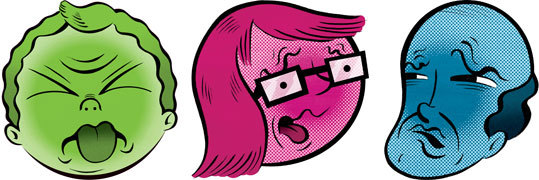
Another thread for our USMB philosophers, sociologists, and psychotheory enthusiasts.
A long but interesting essay in the Boston Globe today explores why certain things repel us while other things do not.
It explores such interesting concepts as arsenic on your dinner plate can kill you and you might view it with alarm, but not feel disgust. A dog turd on your dinner plate, however, will not kill you or perhaps even harm you, but you feel strong revulsion and disgust.
The writer suggests that many of our views and preferences might in fact not be prejudice or bias or bigotry born of religion, politics, or inductive reasoning, but rather something much more inate and inexplicably human.
If this is true, what does it say about our condemnation of prejudice, bigotry, and/or discrimination re certain social phenomena?
Excerpt
What if our moral judgments are driven. . . .by more visceral human considerations? And what if one of those is not divine commandment or inductive reasoning, but simply whether a situation, in some small way, makes us feel like throwing up?
This is the argument that some behavioral scientists have begun to make: That a significant slice of morality can be explained by our innate feelings of disgust. A growing number of provocative and clever studies appear to show that disgust has the power to shape our moral judgments.
Research has shown that people who are more easily disgusted by bugs are more likely to see gay marriage and abortion as wrong. Putting people in a foul-smelling room makes them stricter judges of a controversial film or of a person who doesnt return a lost wallet. Washing their hands makes people feel less guilty about their own moral transgressions, and hypnotically priming them to feel disgust reliably induces them to see wrongdoing in utterly innocuous stories.
Today, psychologists and philosophers are piecing these findings together into a theory of disgusts moral role and the evolutionary forces that determined it: Just as our teeth and tongue first evolved to process food, then were enlisted for complex communication, disgust first arose as an emotional response to ensure that our ancestors steered clear of rancid meat and contagion. But over time, that response was co-opted by the social brain to help police the boundaries of acceptable behavior. Today, some psychologists argue, we recoil at the wrong just as we do at the rancid, and when someone says that a politicians chronic dishonesty makes her sick, she is feeling the same revulsion she might get from a brimming plate of cockroaches.
Disgust was probably the most underappreciated moral emotion, the most unstudied one, says Jonathan Haidt, a psychologist at the University of Virginia. Its become politically much more relevant since the culture wars of the 1990s, and so within the broader renaissance of moral psychology disgust has been a particularly hot topic.
Psychologists like Haidt are leading a wave of research into the so-called moral emotions not just disgust, but others like anger and compassion and the role those feelings play in how we form moral codes and apply them in our daily lives. A few, like Haidt, go so far as to claim that all the worlds moral systems can best be characterized not by what their adherents believe, but what emotions they rely on.

